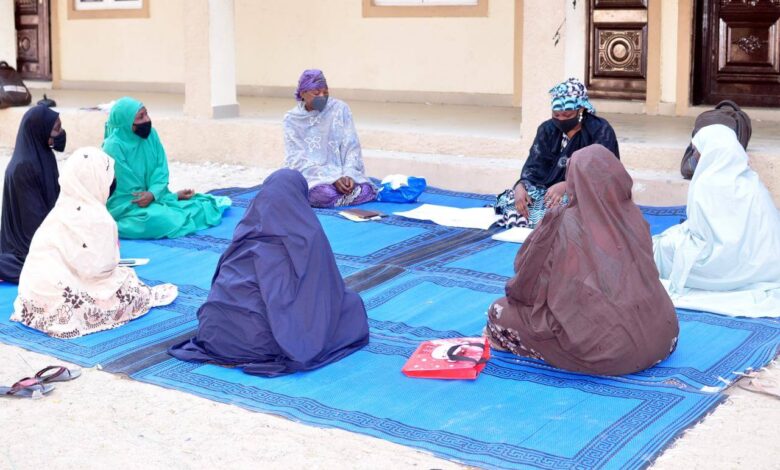Harmful Gender Norms Still Persist In Borno IDPs Despite Support Programme — Survey
The Siblings Support for Adolescents in Emergencies (SSAGE) programme was implemented by Mercy Corps Nigeria in Bulabulin and Bayan Kwatas, two communities that host IDPs in Maiduguri, Borno State, Northeast Nigeria.

Despite implementation of a whole-family support programme that seeks to change ideological constructs that enable violence against women and girls in humanitarian settings, caregivers still felt that girls’ adherence to gender and age norms kept them safer from gender-based violence (GBV).
The Siblings Support for Adolescents in Emergencies (SSAGE) programme implemented by Mercy Corps Nigeria from Sept. to Dec. 2020 in Bulabulin and Bayan Kwatas, two Internally Displaced Persons (IDPs) communities in Maiduguri, Borno State, Northeast Nigeria, was designed to challenge intergenerational cycles of violence against women and girls through a whole-family approach.
In a study published on Friday, May 13 by BioMed Central (BMC), a research journal, six in-depth interviews and six focus group discussions were carried out with adult caregivers, adolescent girls and boys. Interviewees reported greater understanding of gendered power dynamics and improved communication amongst family members.
Female caregivers in particular claimed that changes in their spouses’ communication style enabled a shift towards an even-handed relationship within the family.
“You see, before we didn’t sit together to make decisions but now we do. And he also seeks my advice too,” one of the participants said.
However, heightened protection of adolescent girls was seen as a necessity. Many caregivers, both men and women, framed GBV as a primarily female problem.
Although there was also a change in beliefs about girls’ rights and protection, participants felt that controlling their daughters’ behaviours, restricting their movements and sensitising them on the risk they might face was an appropriate preventive method.
Male caregivers expressed that “there are places a female should be and there are places she shouldn’t be because not every place is good for a woman to be.”
Female caregivers also stressed the importance of restricting their daughters’ movements, “… Once it’s 6 p.m., our girls do not go out.”
Others also claimed that girls’ defiance from norms related to their behaviour, dress, and speech was a driver of male violence against them, both at home and in the broader community.
Decreased perpetration of violence in the household
The study showed that participants reported a decrease in violence across household relationships following engagements with the SSAGE programme.
Majority of the participating adolescent boys recalled how they used negative power and violence to coerce their sisters into adhering to their requests. One of the participants recalled how he and his sister used to fight. “Because I used to make her do things for me at home, even though I can do things myself. I used to make her do it for me because I didn’t want to do hard work.”
Furthermore, many female participants felt the SSAGE programme equipped them with knowledge to better understand risk patterns in their spouses’ behaviours. It also provided them with tools to mitigate conflict.
Male caregivers also reflected on how poverty, alcohol and drug use can act together with the power dynamics between them, their wives, and children to exacerbate violence in the family.
Some participants shared their realisation about the impact of their own drug use, which was often expressed as a coping mechanism. “Before, when I got upset, I would normally take drugs to cool myself, which made me misbehave and led me to do bad things…”
GBV in the humanitarian setting
Violence against women and children is significantly recognized as a humanitarian emergency.
HumAngle has repeatedly reported how female IDPs face physical and emotional violence mostly triggered by displacement.
According to the BMC study, such GBVs stem from the individual. Beliefs such as submissive femininity and dominant masculinity, coupled with reduced access to normal means of support through violence, can trigger GBV in a humanitarian setting. It also transcends to being relational whereby existing marital conflict can be worsened by losing a loved one in an ongoing conflict.
Although the SSAGE programme’s participants have endorsed household and community protective infrastructure for adolescent girls, many decried the lack of functional justice mechanisms at the community and state level.
Support Our Journalism
There are millions of ordinary people affected by conflict in Africa whose stories are missing in the mainstream media. HumAngle is determined to tell those challenging and under-reported stories, hoping that the people impacted by these conflicts will find the safety and security they deserve.
To ensure that we continue to provide public service coverage, we have a small favour to ask you. We want you to be part of our journalistic endeavour by contributing a token to us.
Your donation will further promote a robust, free, and independent media.
Donate HereStay Closer To The Stories That Matter




